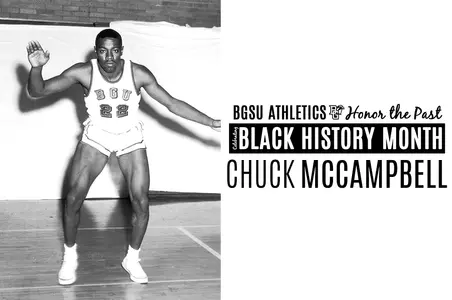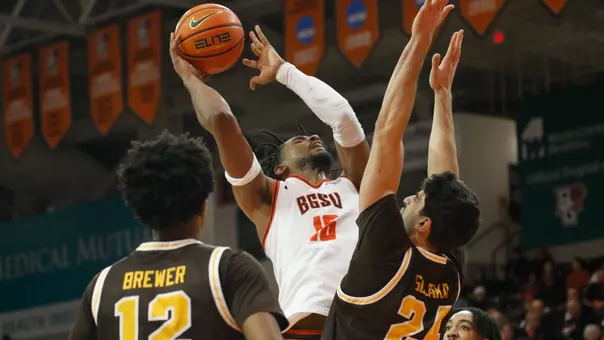Bowling Green State University Athletics

BG Athletics Celebrates Black History Month: Chuck McCampbell
February 23, 2016 | General, Men's Basketball
Throughout the month of February, BGSUFalcons.com will be highlighting some of those who have impacted the University, the community and the athletics department. From pioneers to more recent members of the department, Matt Markey will be providing the stories of our history. Today's feature story highlights Falcon men's basketball player Chuck McCampbell. Fans can review all previous feature stories through our Black History Month landing page by CLICKING HERE.
It was a very different world, as Chuck McCampbell recalls it, when he came to Bowling Green in the fall of 1955 as a two-sport athlete coveted by both the Falcon football and basketball programs.
McCampbell ultimately chose basketball, and he was a captain on the undefeated freshman team at Bowling Green, and part of the true integration of the basketball program under legendary coach Harold Anderson. McCampbell said he was one of just 40 some black students on campus at the time, and in his sophomore year he was part of a varsity squad that was made up of six black players and six white players.
"There wasn't any discrimination as far as coach Anderson was concerned, but it was an unusual experience because it was sort of considered taboo at the time to have more than three black players on the court at one time," McCampbell said. "It was different, because I came out of Columbus and we always had blacks and whites playing together in high school, but on the college level it was not the norm to have many blacks on the basketball team."
McCampbell said change was slow to take hold, and he saw subtle discrimination play out away from the basketball court.
"We felt accepted during the basketball games. You walked out on the court and played and everyone was cheering for you, but as soon as the game was over, things were different," he said. "When the same people that were cheering for you saw you walking across campus, all of a sudden they were more interested in something else that was going on, and they didn't acknowledge you."
McCampbell made a distinct impression on the court, winning second-team All Mid-American Conference honors as a junior, and first-team honors as a senior, making him Bowling Green's first African-American to make the all-conference team. He was also voted a captain of BG's MAC championship team as a senior.
When the Falcons defeated Miami for that conference title in McCampbell's senior season, they moved on to face Marquette in the first NCAA Tournament appearance in BGSU history. The trip to Lexington for the first round of the NCAA ended with an 89-71 loss to Marquette, and it included some reminders that racism was still present in the U.S.
"In Lexington, there were some facilities that the black players were not allowed to use, so there was still segregation going on," McCampbell said. "And the black guy working at the shoe shine stand wasn't allowed to shine our shoes."
McCampbell, who served 20 years in the U.S. Army after graduating from BG, said his basketball experience was still a very positive one. "The basketball program was first class, and I never had any problems with my white teammates," he said.
He was awarded the Bronze Star while serving in the Vietnam War, played on the All-Army basketball team, and retired in 1980 at the rank of Major. McCampbell said he remains grateful to BGSU for his education.
"I'm indebted to Bowling Green," said McCampbell, who founded the Heritage Paper Company in New Jersey after leaving the Army, and remains its president. "I grew up in a difficult situation in Columbus, in a broken home, and the opportunity to go to school there changed my life. BG had some fantastic people there at the time, and the faculty and administration were trying to do the right thing. They were very supportive, and I'm still very much indebted to them."
It was a very different world, as Chuck McCampbell recalls it, when he came to Bowling Green in the fall of 1955 as a two-sport athlete coveted by both the Falcon football and basketball programs.
McCampbell ultimately chose basketball, and he was a captain on the undefeated freshman team at Bowling Green, and part of the true integration of the basketball program under legendary coach Harold Anderson. McCampbell said he was one of just 40 some black students on campus at the time, and in his sophomore year he was part of a varsity squad that was made up of six black players and six white players.
"There wasn't any discrimination as far as coach Anderson was concerned, but it was an unusual experience because it was sort of considered taboo at the time to have more than three black players on the court at one time," McCampbell said. "It was different, because I came out of Columbus and we always had blacks and whites playing together in high school, but on the college level it was not the norm to have many blacks on the basketball team."
McCampbell said change was slow to take hold, and he saw subtle discrimination play out away from the basketball court.
"We felt accepted during the basketball games. You walked out on the court and played and everyone was cheering for you, but as soon as the game was over, things were different," he said. "When the same people that were cheering for you saw you walking across campus, all of a sudden they were more interested in something else that was going on, and they didn't acknowledge you."
McCampbell made a distinct impression on the court, winning second-team All Mid-American Conference honors as a junior, and first-team honors as a senior, making him Bowling Green's first African-American to make the all-conference team. He was also voted a captain of BG's MAC championship team as a senior.
When the Falcons defeated Miami for that conference title in McCampbell's senior season, they moved on to face Marquette in the first NCAA Tournament appearance in BGSU history. The trip to Lexington for the first round of the NCAA ended with an 89-71 loss to Marquette, and it included some reminders that racism was still present in the U.S.
"In Lexington, there were some facilities that the black players were not allowed to use, so there was still segregation going on," McCampbell said. "And the black guy working at the shoe shine stand wasn't allowed to shine our shoes."
McCampbell, who served 20 years in the U.S. Army after graduating from BG, said his basketball experience was still a very positive one. "The basketball program was first class, and I never had any problems with my white teammates," he said.
He was awarded the Bronze Star while serving in the Vietnam War, played on the All-Army basketball team, and retired in 1980 at the rank of Major. McCampbell said he remains grateful to BGSU for his education.
"I'm indebted to Bowling Green," said McCampbell, who founded the Heritage Paper Company in New Jersey after leaving the Army, and remains its president. "I grew up in a difficult situation in Columbus, in a broken home, and the opportunity to go to school there changed my life. BG had some fantastic people there at the time, and the faculty and administration were trying to do the right thing. They were very supportive, and I'm still very much indebted to them."
BG MBB : Postgame Interviews 2.28
Saturday, February 28
WTEN: HC Mike Bonnell vs. Northern Kentucky (2-27-26)
Saturday, February 28
WTEN: Konstantina Adamopoulou vs. Northern Kentucky (2-27-26)
Saturday, February 28
"Outside the Chalk" - Addie Martin (Feb. 24, 2026)
Wednesday, February 25




